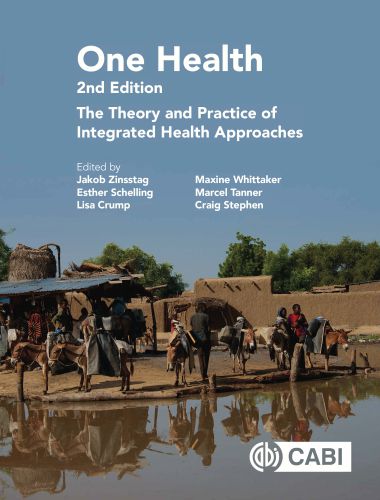One Health, The Theory and Practice of Integrated Health Approaches, 2nd Edition
by

One Health, the concept of connecting veterinary and human health, has now expanded beyond infectious diseases and zoonoses to incorporate a wider suite of health issues and a broader scope of practice. Closer cooperation between human and animal health disciplines is proven to result in measurable lives saved, better health, faster detection of new disease, and financial savings.
In this new edition, the expert author team illustrates the contribution of One Health collaborations to real-world issues such as sanitation, economics, food security and vaccination programmes. Retaining its interdisciplinary focus which combines theory with practice, the book includes more non-infectious disease issues to mirror the changing field of One Health. It promotes an action-based, solutions-oriented approach through practical content on methodological tools, data gathering, monitoring techniques, study designs, and mathematical models. New to the second edition are:
• Revised case studies that draw out implications for practice;
• Coverage of issues such as climate change, the Sustainable Development Goals and global food security;
• Expanded methodology chapters to include skills relevant to emerging issues;
• Expanded methods sections incorporating leadership and perspectives needed for success.
Extending its global relevance through a wider author team, One Health: The Theory and Practice of Integrated Health Approaches combines research and practice in one broad-ranging volume. As the world faces increasing risks from zoonotic diseases, this edition could not be timelier in highlighting lessons for human and animal health professionals, students and policy and development decision makers.
One Health embraces the environmental and ecological dimension of health, fuelled by climate change, pollution, waste management crises, the dramatic decline of biodiversity and extinction of wildlife species and plants and therefore makes significant contributions to the global attempts of reaching the Sustainable Development Goals (SDGs). Non-communicable diseases, gradually and rapidly dominating the worldwide burden of diseases, extend the scope of One Health by their linkages to nutrition, food safety and security as well as mental and spiritual health, animal-assisted interventions and the human–animal bond.
Increasing antimicrobial resistance (AMR) globally raises serious health and economic concerns. The main drivers and determinants of the spread and subsequent colonization of resistant bacterial strains between humans, animals and the environment are still mostly unknown. AMR is therefore not only a quintessential One Health issue, but One Health is an essential prerequisite for a systemic understanding of AMR acquisition and spread and for identifying, developing and validating effective control strategies. Animal Models of Epilepsy Methods and Innovations
The current most illustrative example for the need for integrated approaches to health is the spread of the new coronavirus (COVID-19). It demonstrates the global systemic consequences of poorly understood animal–human interfaces, a butterfly effect,1 in a likely zoonotic event which led to worldwide, serious economic consequences from reductions in trade and shortages of interconnected supply and production chains. Tragically, the prevailing shortsighted financial planning ignores the urgency of assessing the broader ramifications of public health and reduced funding for public health, particularly veterinary public health, an investment that would cost only a negligible fraction of the social and economic losses we wit-ness today.
The insights gained from drastic examples like the recent COVID-19 epidemics along with the significant body of successful research and applications, as partly summarized in this second edition, encourage us ever more to insist on demonstrating the added value of integrated approaches and cooperation between related health sectors. It is only through integrative and iterative forms of cooperation that we can create the urgently required comprehensive policies to protect human and animal public health and preserve ecosystem services, a most powerful contribution to reduce and mitigate environmental and climate change.
